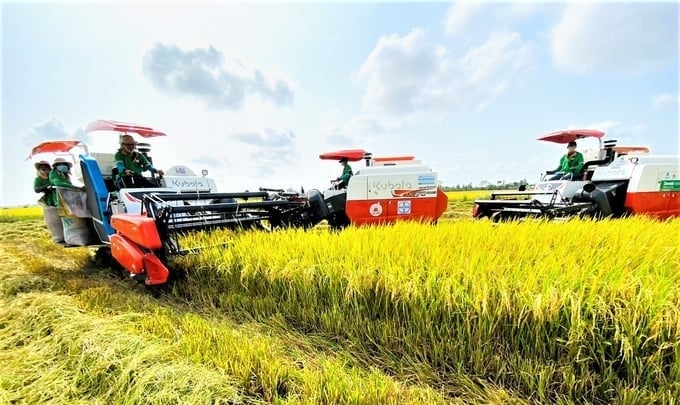November 24, 2025 | 08:04 GMT +7
November 24, 2025 | 08:04 GMT +7
Hotline: 0913.378.918
November 24, 2025 | 08:04 GMT +7
Hotline: 0913.378.918

Traders act as a bridge between farmers and businesses, limiting possible risks for parties involved in the rice industry value chain.
Prime Minister Pham Minh Chinh has just signed Directive No.10/CT-TTg dated March 2, 2024, on promoting sustainable, transparent, and effective rice production, business, and export in the new situation.
The directive clearly states that in 2023, the global food market had many unusual fluctuations, but with the close, flexible and timely direction of the Government, the Prime Minister, ministries, central branches and localities. With the persistent efforts of farmers, the perseverance of businesses, and solutions to open the market and circulate goods, the rice industry has achieved remarkable results in exports and imports (exported over 8.1 million tons of rice, worth nearly US$ 4.7 billion, an increase of 14.4% in volume and 35.3% in value over the same period in 2022 and is the highest level over the past 16 years), making an essential contribution to firmly ensuring national food security.
In the rice industry chain, traders play an important role after each crop. Traders help food companies access/buy fresh rice in the fields for rice farmers, thereby solving the transportation problem for farmers and the drying process after harvesting rice.
When talking about traders, Minister of Agriculture and Rural Development Le Minh Hoan said that traders are an indispensable part of agricultural production and business in the Mekong Delta. Traders need to be seen as partners with producers and companies. Traders need to be confident in their role as a more proactive and positive contributor to the value chain of the agricultural industry.
In addition to piloting the introduction of traders into the rice industry value chain, the Government also assigned the State Bank to direct commercial banks to create favorable conditions for farmers and businesses to access credit sources at high-preferential rates, fully meeting credit needs for rice purchasing and rice export, especially purchasing rice for the winter-spring crop of 2023-2024 in the Mekong Delta provinces.
The study also proposes that competent authorities consider promulgating a credit program to support the production, processing, and consumption of high-quality and low-emission rice products in the Mekong Delta between cooperatives and enterprises following the provisions of the law.
Translated by Tuan Huy

(VAN) The agricultural sector is finalizing the strategic framework for emission reduction, setting the goal of sharply cutting methane and 403.7 million tons of CO2 equivalent and moving toward Net Zero by 2050.
/2025/11/22/2236-1-153832_483.jpg)
(VAN) The National Marine Spatial Planning is opening up opportunities for sustainable blue sea development across 21 coastal localities.

(VAN) Viet Nam’s forestry sector is undergoing a comprehensive transformation, strengthening management, protection, and development efforts to maintain ecological security and drive green, sustainable growth.

(VAN) Viet Nam is accelerating efforts to digitize reservoir operations, from real-time data to hydraulic modelling.
/2025/11/21/3348-2-102623_454.jpg)
(VAN) National Assembly delegate Nguyen Thi Lan has proposed adding special mechanisms to attract human resources to the agricultural, forestry, and fishery sectors, addressing the shortage of high-quality personnel.

(VAN) Over the past two decades, the unified legal framework for water resource management has been perfected, becoming a crucial foundation for ensuring national water security.

(VAN) The land-data cleansing campaign in Dien Bien is entering its final stretch, yet weak infrastructure, limited personnel and fragmented multi-period datasets continue to create major obstacles.